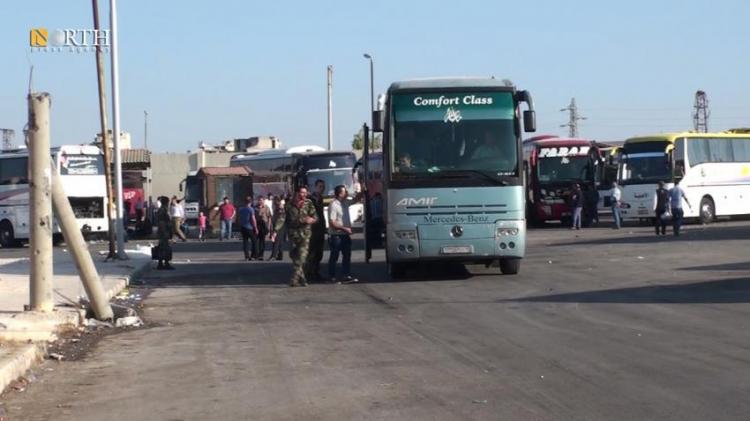Aleppo – North-Press Agency
With the decision to extend the ban on movement between the governorates this week by the Syrian government, travel by private cars that have permits to move became the only way for the residents of Aleppo to travel in a way resembles smuggling, with the neglect of the Syrian government forces' checkpoints deployed on main roads for money.
Despite initially specifying a period during which the Syrian government allowed travel on Saturday and Thursday of each week, it backtracked and banned travel completely on the 2nd of May.
Double wages
Mohsen Hamada, one of those wishing to travel from Aleppo to the city of Latakia, revealed that under these conditions he can only travel with private cars that have permission to travel for various purposes.
"We have to travel in this way after paying large amounts of money, as it is considered a smuggling and illegal in light of these measures. The transportation fare from Aleppo to Latakia in this way reaches 25,000 Syrian pounds and perhaps more," he added.
The Syrian government decided to completely reinstate the travel ban at the end of first week of the month of Ramadan, in conjunction with the discovery of new cases of coronavirus in Damascus.
Abdulkarim Hamza, a resident of the al-Hamdaniya neighborhood of Aleppo city, told North-Press that urgent health conditions mean that he must travel to Damascus to conduct medical tests in the capital's hospitals, but he was unable to travel during the specified period set by the Syrian government due to heavy crowding in bus stations and the lack of vacant seats in most buses going to Damascus.
"I waited more than four hours and I couldn't get a ticket to travel, so I had to go back."
Last Friday, congestion in the starting points of the bus stations prevented many from traveling from Aleppo to other cities and governorates, which led them to search for other means of transportation and access to the city they want to go to at a higher cost.
Governmental ban
Director of the press office in Aleppo governorate Muhammad al-Anan told North-Press that the process of closing the governorates to citizens' entry "has reaped results up to this moment, as the virus has not been found outside of the governorate of Damascus and some of its countryside, and opening the way for people to travel between the governorates will lead to adverse results."
Al-Anan stressed the need for residents to abide by the travel ban, noting that "those who are forced to travel due to illness and receive treatment can submit a letter to the Aleppo governorate council to have their status considered in order to be given a special permit in case there are urgent reasons for their travel."
Corruption and lack of fairness
Taxi driver Abdulghani Balash said that some car owners were able to obtain permission to travel between governorates.
"Some relied on their acquaintances to obtain these approvals, and others obtained it because they are government employees and their work requires them to travel even during the ban period."
He added that these people are transporting passengers who are forced to travel in exchange for huge sums of money determined according to the customer, their work, and their destination, so the fare to travel to Damascus via these cars may reach 30,000 Syrian pounds per passenger."
Balash criticized the "exploitation" by car owners for the need of some to move between governorates in light of the "conditions in the country because of coronavirus, which generated a profitable profession that has a network of beneficiaries, while we, the other drivers, still suffer from the ban on travel and home quarantine, and incur many financial losses."
Apart from the exploitation of the need for the population in a number of Syrian governorates to move for legitimate reasons, this method of movement could carry risks of the increased possibility of the spread of the new virus in Syria, in light of the weak medical capabilities to deal with the spread of the novel coronavirus in the country, in addition to the lack of facilities and infrastructure which have become worn out as a result of years of war.

